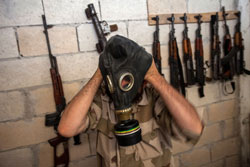 The United Nations Security Council reported an attack on a suburb of Damascus, the capital of Syria on August 21. According to the UN, the victims of the violence experienced “shortness of breath, disorientation, extreme eye irritation, blurred vision, vomiting, weakness and loss of consciousness.”
The United Nations Security Council reported an attack on a suburb of Damascus, the capital of Syria on August 21. According to the UN, the victims of the violence experienced “shortness of breath, disorientation, extreme eye irritation, blurred vision, vomiting, weakness and loss of consciousness.”
Thirty-five days later, the whole world’s attention has been focused on Syria and its President, Omar Assad. The words “nerve gas” and “chemical weapons” have grabbed the attention of everyone from United Nation officials to citizens in the United States.
It was suspected that the chemical weapon used was sarin gas, a dangerous nerve agent that usually leads to fatalities when it comes into contact with humans.
According to the Center for Disease Control, nerve gas is a man-made substance that once inhaled, or ingested, causes overstimulation of neurons, leading to bodily functions slowing or stoping. With sarin, it can take seconds for the body to start reacting, typically with the victim having trouble moving, breathing and dying.
According to CNN, the last time there was a large scale attack using nerve gas was by Saddam Hussein on Iraqi citizens in 1988. However, violence in Syria is not uncommon. Prior to the nerve gas attack, there have been more than 100,000 deaths in Syria. Also, 2,000,000 Syrians have been displaced by a civil war that has scared the region for the last two and a half years.
According to Dr. Saliba Sarsar, Associate Vice President for Global Initiatives and political science professor, the civil war has been brewing since March of 2011.
Sarsar said, “There is a Sunni, and Shia (two largest sects of Islam) issue within the country, but it goes beyond that. Factions within and outside the country have fueled this civil war.”
One faction comes from Russian president Vladimir Putin who has backed the Syrian President and his regime. The regime is mostly composed of Alawites and Shia Muslims, who are minorities in a Sunni dominated country.
“They have a population that is suffering serious harms, insurgency, repression, or state failure,” said Sarsar. The nerve gas attack may just have been “the straw that broke the camel’s back” for the international world, she explained.
On August 21, Ban Ki-Moon, Secretary General of the UN stated there was “clear and convincing evidence” that sarin gas was used and that the Syrian government was responsible for the attack. This confirmation led to President Barack Obama requesting clearance for military mobilization.
According to CNN on Saturday September 14, 2013, US reached an agreement with Russia that called for Syria’s chemical weapons list, and eventual removal of all chemical weapons.
Drew Corrigan, junior Health and phys-ed major, said, “The crisis needed to be addressed in some way, with either international or American intervention.” He continued, “but I am glad to see [them] come to an agreement rather than to have American lives risked.”
In an op-ed piece Sarsar delved into the question of who is responsible to aid in the Syrian crisis. He asked crucial questions such as, “How many Syrians must die? When will countries stop hiding behind their distinct national sovereignty in support of international decency and our common humanity?”
Sarsar presents an alternative plan rather than an US offensive if Assad’s regime cannot comply with international agreements.
“A better approach would be to neutralize the Assad regime, find a one way exit for Assad, his family, and advisors. Let the ICC, International Criminal Court, hold him accountable for crimes against humanity, remaining Syrian leadership, and non-terroristic Syrian opposition create the new Syria, one that meets the basic needs of the Syrian people, including minorities,” Sarsar proposed.
The end goal is for Syria to be led out of conflict, with a more democratic, inclusive structure. Sarsar stated that the international community have a responsibility to protect these people who will need great humanitarian aid.
As the world awaits Assad’s next move, many wait to see how the international community reacts. Syria is not a ratified member of the Rome Statutes (the bylaws of the ICC) ; therefore, they are not subject to the ICC’s jurisdiction unless the UN Security Council makes a case against Assad.
The ICC was founded to counteract the impunity that is often granted to dictators in their own states. The Syrian crisis has shined a huge light on the confusion that comes with international law and state sovereignty.
PHOTO TAKEN from huffingtonpost.com


